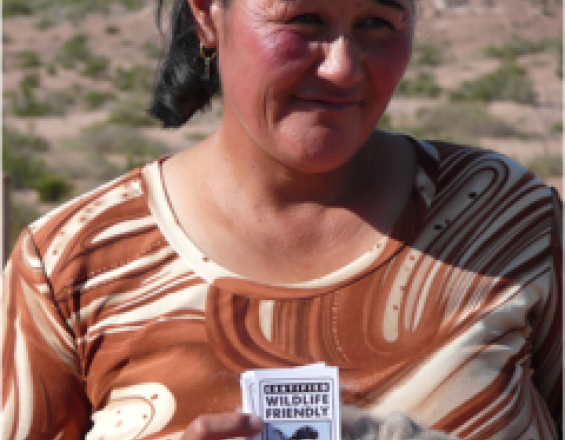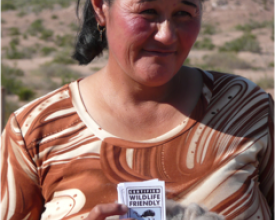
Agricultura con certificación Wildlife Friendly™.

Con más de un tercio de la superficie del planeta dedicada a la agricultura -y más de una cuarta parte al pastoreo-, las granjas y los ranchos suponen una gran amenaza y una enorme oportunidad para la conservación de la fauna salvaje. Aplicar estrategias para proteger especies clave en tierras agrícolas es fundamental para la viabilidad de las poblaciones de fauna salvaje, sobre todo a medida que disminuyen los espacios abiertos y se hacen accesibles zonas antaño remotas. Al ofrecer a los productores agrícolas de todo el mundo normas científicamente fundamentadas y mensurables, Certified Wildlife Friendly™ celebra la gestión de la vida silvestre en las explotaciones. Con este planteamiento, la Red de Empresas Respetuosas con la Fauna y Flora Silvestres (WFEN, por sus siglas en inglés) trabaja para apoyar tanto a las comunidades como a la fauna y flora silvestres mediante la creación de incentivos para una gestión ecológica adecuada de las tierras agrícolas y ganaderas de todo el mundo.
Contexto
Défis à relever
La producción agrícola plantea muchas amenazas para la biodiversidad mundial, con ejemplos que incluyen la pérdida y fragmentación de hábitats críticos, la conversión y el vallado de tierras, la matanza de depredadores que causan pérdidas de ganado y el uso de productos químicos. En muchas comunidades, la falta de oportunidades económicas provoca la caza o la caza furtiva de animales salvajes como medio para sobrevivir. Aunque en algunos lugares se han implantado las mejores prácticas, estas directrices no siempre son accesibles para los agricultores que trabajan en algunos de los lugares más conflictivos para el hombre y la fauna salvaje, que pueden considerar que las soluciones son demasiado caras de aplicar, incluso cuando están disponibles. Sin embargo, existe una creciente comunidad de productores que se esfuerzan por minimizar el impacto sobre la biodiversidad y un segmento de consumidores cada vez mayor que gravita hacia productos que contribuyen a la conservación de la fauna salvaje. La WFEN trata de minimizar las barreras de entrada para que los agricultores hagan realidad los productos Wildlife Friendly™ y sus respectivos mercados.
Ubicación
Procesar
Resumen del proceso
Los criterios de certificación deben adaptarse al contexto local para garantizar que las comunidades se benefician del enfoque empresarial, con el fin de apoyar la creación de valor en la conservación de la biodiversidad. Al mismo tiempo, las partes interesadas locales deben participar desde el inicio del proceso de planificación, en la redacción de las normas y en la aplicación de los criterios.
Bloques de construcción
Elaboración de normas para la agricultura y la biodiversidad guiadas por expertos
La Wildlife Friendly Enterprise Network ofrece una serie de programas de certificación que promueven normas de buenas prácticas para empresas agrícolas y ganaderas de todo el mundo. Estas normas representan las mejores prácticas mundiales con la aportación de los expertos adecuados para garantizar que a) las especies clave de fauna y flora silvestres estén protegidas para lograr un impacto positivo neto y b) las comunidades locales participen activamente.
Factores facilitadores
Los contextos locales y políticos, las fuerzas del mercado y las amenazas a especies clave y las necesidades de las comunidades locales son factores importantes para garantizar que la certificación sea una solución viable allí donde trabajamos.
Lección aprendida
La participación de socios expertos y perspectivas locales en la redacción de las normas de nuestros programas de certificación garantiza que nuestros criterios sean pertinentes y beneficiosos en los contextos en los que trabajamos, para las comunidades y las especies clave implicadas.
Participación de las comunidades locales en las empresas Wildlife Friendly™.
Las empresas tienen más éxito cuando aprovechan la fuerte implicación de la comunidad, colaboran con una organización conservacionista local y se dedican a la conservación de la vida salvaje. Formar asociaciones sólidas y vías de comunicación sobre el terreno garantiza que la certificación beneficie a las comunidades locales e incentive la protección de la biodiversidad.
Factores facilitadores
Las vías abiertas de comunicación y el desarrollo de la confianza con todas las partes interesadas son fundamentales para el éxito de las asociaciones locales y los enfoques basados en la empresa.
Lección aprendida
La formación de asociaciones en las primeras fases del proceso de planificación del proyecto y la participación de los socios locales en las primeras fases de ejecución ayudan a garantizar la inversión local en el propio programa y la gestión de las especies que la certificación pretende proteger. Estas asociaciones tienen más éxito cuando las comunidades y los grupos locales ven el valor de la certificación y buscan ellos mismos el apoyo externo.
Impactos
La certificación Wildlife Friendly™ proporciona directrices de buenas prácticas para las empresas agrícolas y ganaderas que buscan generar empleo sostenible desde el punto de vista medioambiental y seguridad alimentaria en algunos de los puntos críticos de biodiversidad más importantes del planeta. Las historias que hay detrás de los productos fidelizan a los consumidores y abren el acceso a nuevos mercados, lo que beneficia a las comunidades locales. Incentivar las mejores prácticas en todo el territorio garantiza resultados positivos de conservación y una mayor tolerancia de la fauna salvaje. Los agricultores y ganaderos Wildlife Friendly™ poseen una fuerte ética conservacionista y muchos han estado dispuestos a cambiar sus prácticas para conseguir la certificación: las empresas han optado por prohibir la caza de trofeos, poner en marcha programas de seguimiento y proporcionar nuevos beneficios a las comunidades. Ibis Rice™ apoya a las comunidades que cultivan arroz de alta calidad, protegiendo los humedales críticos de Camboya, y da una parte del arroz y de los beneficios a las aldeas agrícolas. Se están creando nuevas empresas en torno a la idea de Wildlife Friendly™ desde el principio, como el té Elephant Friendly™, recientemente certificado, una colaboración con el grupo Broader Impacts de la Universidad de Montana, y el café Jaguar Friendly™, una colaboración entre ProCAT, el Arizona Center for Nature Conservation/Phoenix Zoo y Press Coffee.
Beneficiarios
Las empresas de la WFEN benefician a más de 270.000 personas en todo el mundo gracias a la formación, las oportunidades de empleo, la mejora de la educación infantil y la atención sanitaria derivada de la reinversión de los ingresos.




